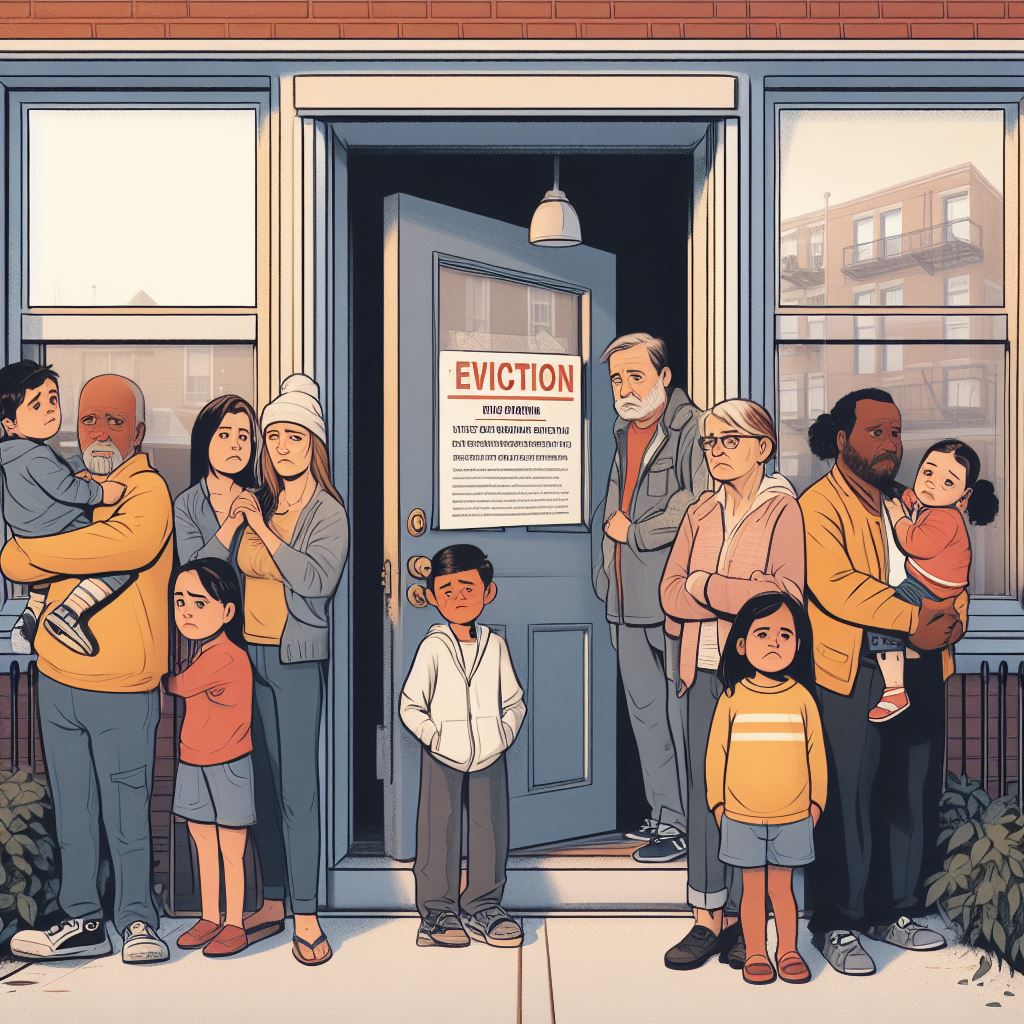Crucial Eviction Regulations in Subsidized Housing Explained

Are you living in subsidized housing? Do you know the eviction regulations that can affect you?
In this article, we will explain the crucial eviction regulations in subsidized housing. From eligibility criteria to the eviction process and tenant rights, we will provide you with all the necessary information.
Stay informed and empowered to protect your rights as a tenant in subsidized housing.
Key Takeaways
- Grounds for eviction in subsidized housing include failure to pay rent, violation of lease terms, engaging in illegal activities, damaging the property, and providing false information during the application process.
- The eviction process in subsidized housing typically involves the landlord or housing agency providing a written notice of eviction, allowing the tenant an opportunity to respond, and potentially going through court proceedings if the eviction is unresolved.
- Eligibility criteria for eviction in subsidized housing include violation of lease terms, exceeding the income eligibility limit, and providing false information or failing to provide required documentation. Eviction is not automatic and specific procedures must be followed.
- Tenants in subsidized housing have rights during the eviction process, including the right to due process, the right to challenge the eviction in court, and the availability of tenant protections depending on state or local laws. It is important for tenants to assert their rights and utilize available protections.
Understanding Subsidized Housing Eviction Regulations
To understand subsidized housing eviction regulations, you need to familiarize yourself with the specific rules and guidelines in place. These regulations are designed to protect both tenants and landlords in subsidized housing programs. One important aspect to consider is the grounds for eviction. Subsidized housing eviction regulations typically outline specific reasons for which a tenant can be evicted, such as failure to pay rent, violation of lease terms, or engaging in illegal activities. It’s crucial to understand these grounds in order to avoid potential eviction.
Another key aspect of subsidized housing eviction regulations is the eviction process itself. These regulations establish the steps that must be followed when evicting a tenant, including providing proper notice, giving the tenant an opportunity to address the issue, and obtaining a court order if necessary. Understanding the eviction process can help tenants navigate their rights and responsibilities, as well as ensure that landlords follow the correct procedures.
Furthermore, subsidized housing eviction regulations often provide protections for tenants, such as the right to a hearing or the ability to dispute an eviction. These protections are in place to prevent tenants from being unjustly evicted and to ensure a fair and equitable process.
Eligibility Criteria for Eviction in Subsidized Housing
You need to meet specific eligibility criteria to be evicted from subsidized housing. These criteria are put in place to ensure that the eviction process is fair and just.
One of the main eligibility criteria is the violation of the terms of the lease agreement. This can include failure to pay rent, engaging in illegal activities, damaging the property, or violating any other provision outlined in the lease.
Another eligibility criterion is the determination of income eligibility. Subsidized housing is meant for individuals or families with low incomes, so if your income exceeds the maximum limit set by the program, you may be deemed ineligible for continued occupancy.
Additionally, if you provide false information or fail to provide required documentation during the application process, you may also be subject to eviction.
It’s important to note that eviction from subsidized housing isn’t automatic. The process requires following specific procedures outlined by the housing agency or landlord. Understanding these procedures is essential to navigate the eviction process, which will be further discussed in the subsequent section about the eviction process and timeline in subsidized housing.
Eviction Process and Timeline in Subsidized Housing
The eviction process and timeline in subsidized housing can be complex and vary depending on the specific procedures outlined by the housing agency or landlord. It’s important to understand these processes to ensure you’re aware of your rights and responsibilities. Here are four key aspects to consider:
- Notice of eviction: Typically, the eviction process begins with the landlord or housing agency providing you with a written notice. This notice will outline the reason for eviction and the timeframe within which you need to respond or vacate the premises.
- Opportunity to respond: In some cases, you may have the opportunity to respond to the eviction notice. This could involve attending a hearing or meeting with the landlord or housing agency to present your case or provide any necessary documentation.
- Court proceedings: If you’re unable to resolve the eviction through negotiations or discussions, it may proceed to court. Here, a judge will review the case and make a final decision regarding eviction.
- Timeline for eviction: The timeline for eviction can vary depending on various factors, such as the jurisdiction, backlog of cases, and the complexity of the situation. Generally, it can take several weeks to months for an eviction to be completed.
Understanding the eviction process and timeline in subsidized housing is crucial for tenants to navigate the system effectively and protect their rights. It’s recommended to seek legal advice if you’re facing eviction to ensure you understand the specific procedures and your options.
Tenant Rights and Protections During Eviction
During an eviction, it’s important for you, as a tenant, to frequently assert your rights and utilize the available protections. Understanding your rights and the eviction process can help you navigate the situation more effectively.
One of the key rights you have during an eviction is the right to due process. This means that your landlord must follow specific procedures and provide you with notice before evicting you. The notice should include the reason for the eviction and a reasonable timeframe for you to respond or rectify the situation.
Additionally, you have the right to challenge the eviction in court. If you believe that the eviction is unjust or that your landlord hasn’t followed the proper procedures, you can present your case before a judge. It’s crucial to gather evidence, such as communication records or maintenance requests, to support your claims.
Furthermore, certain tenant protections may be available to you during an eviction. These protections vary depending on your state or local laws, but they often include the right to a relocation assistance or the opportunity to negotiate a repayment plan if you’re behind on rent.
Resources and Support for Tenants Facing Eviction in Subsidized Housing
To access resources and support when facing eviction in subsidized housing, tenants can turn to a variety of organizations and programs. Here are four options that can provide assistance and guidance during this difficult time:
- Legal Aid Organizations: These organizations offer free or low-cost legal services to tenants facing eviction. They can help tenants understand their rights, navigate the legal process, and provide representation in court if necessary.
- Tenant Rights Hotlines: Many cities have tenant rights hotlines that provide information and guidance to tenants facing eviction. These hotlines are staffed by knowledgeable professionals who can answer questions, provide resources, and offer support.
- Nonprofit Housing Organizations: Nonprofit housing organizations often have programs in place to assist tenants facing eviction. They can provide financial assistance, mediation services, and connections to other resources in the community.
- Community Legal Clinics: Community legal clinics offer free legal advice and representation to low-income individuals, including tenants in subsidized housing. They can help tenants understand their rights, negotiate with landlords, and advocate for their interests.
By reaching out to these organizations and programs, tenants facing eviction in subsidized housing can access the resources and support they need to navigate the process and potentially avoid losing their homes.
It’s important for tenants to take advantage of these resources as early as possible to increase their chances of a positive outcome.
Frequently Asked Questions
Can a Tenant Be Evicted From Subsidized Housing if They Are Behind on Rent Payments?
Yes, you can be evicted from subsidized housing if you are behind on rent payments. The regulations in subsidized housing allow for eviction if tenants fail to meet their financial obligations.
Are There Any Circumstances Where a Tenant Can Be Evicted From Subsidized Housing Without Notice?
Without notice, a tenant in subsidized housing can be evicted if they engage in illegal activities, cause significant damage, or pose a threat to others. It’s crucial to understand the specific regulations in place.
What Rights Do Tenants Have if They Believe Their Eviction From Subsidized Housing Is Unjust?
If you believe your eviction from subsidized housing is unjust, you have rights. You can challenge the eviction in court, present evidence, and argue your case. Consult a lawyer for guidance and support.
Can a Tenant Be Evicted From Subsidized Housing if They Have a Disability That Requires Reasonable Accommodations?
If you have a disability that requires reasonable accommodations, you cannot be evicted from subsidized housing solely for that reason. The law protects your rights and ensures equal access to housing.
Are There Any Resources Available to Help Tenants Facing Eviction From Subsidized Housing Find Alternative Housing Options?
There are resources available to help you find alternative housing options if you are facing eviction from subsidized housing. These resources can provide assistance and guidance in locating suitable housing alternatives.



